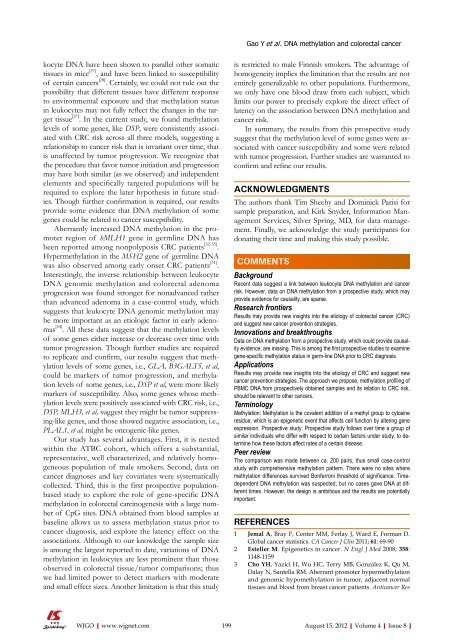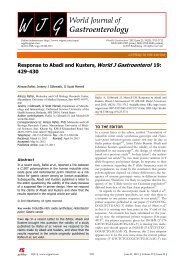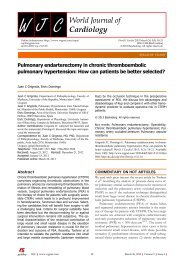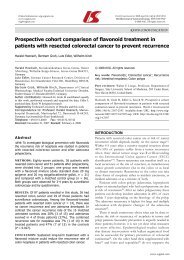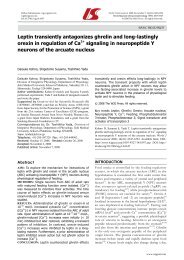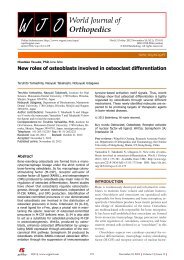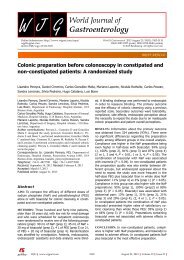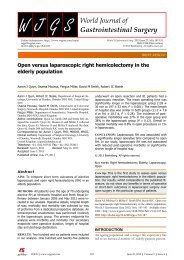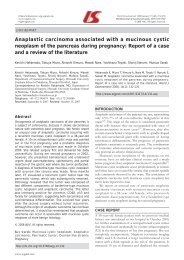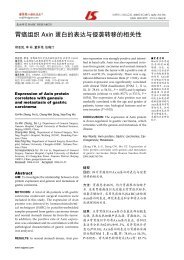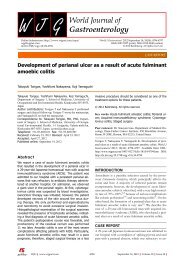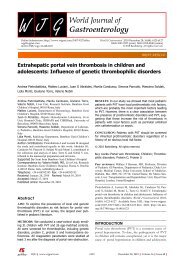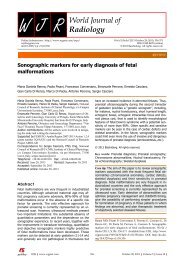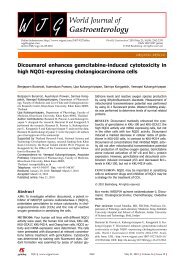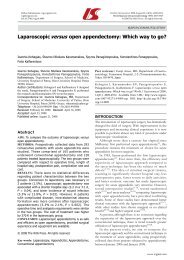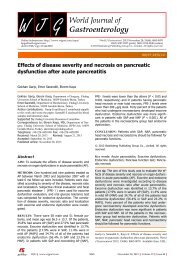Gastrointestinal Oncology - World Journal of Gastroenterology
Gastrointestinal Oncology - World Journal of Gastroenterology
Gastrointestinal Oncology - World Journal of Gastroenterology
Create successful ePaper yourself
Turn your PDF publications into a flip-book with our unique Google optimized e-Paper software.
kocyte DNA have been shown to parallel other somatic<br />
tissues in mice [27] , and have been linked to susceptibility<br />
<strong>of</strong> certain cancers [28] . Certainly, we could not rule out the<br />
possibility that different tissues have different response<br />
to environmental exposure and that methylation status<br />
in leukocytes may not fully reflect the changes in the target<br />
tissue [27] . In the current study, we found methylation<br />
levels <strong>of</strong> some genes, like DSP, were consistently associated<br />
with CRC risk across all three models, suggesting a<br />
relationship to cancer risk that is invariant over time, that<br />
is unaffected by tumor progression. We recognize that<br />
the procedure that favor tumor initiation and progression<br />
may have both similar (as we observed) and independent<br />
elements and specifically targeted populations will be<br />
required to explore the later hypothesis in future studies.<br />
Though further confirmation is required, our results<br />
provide some evidence that DNA methylation <strong>of</strong> some<br />
genes could be related to cancer susceptibility.<br />
Aberrantly increased DNA methylation in the promoter<br />
region <strong>of</strong> hMLH1 gene in germline DNA has<br />
been reported among nonpolyposis CRC patients [32-35] .<br />
Hypermethylation in the MSH2 gene <strong>of</strong> germline DNA<br />
was also observed among early onset CRC patients [31] .<br />
Interestingly, the inverse relationship between leukocyte<br />
DNA genomic methylation and colorectal adenoma<br />
progression was found stronger for nonadvanced rather<br />
than advanced adenoma in a case-control study, which<br />
suggests that leukocyte DNA genomic methylation may<br />
be more important as an etiologic factor in early adenomas<br />
[54] . All these data suggest that the methylation levels<br />
<strong>of</strong> some genes either increase or decrease over time with<br />
tumor progression. Though further studies are required<br />
to replicate and confirm, our results suggest that methylation<br />
levels <strong>of</strong> some genes, i.e., GLA, B3GALT5, et al,<br />
could be markers <strong>of</strong> tumor progression, and methylation<br />
levels <strong>of</strong> some genes, i.e., DSP et al, were more likely<br />
markers <strong>of</strong> susceptibility. Also, some genes whose methylation<br />
levels were positively associated with CRC risk, i.e.,<br />
DSP, MLH3, et al, suggest they might be tumor suppressing-like<br />
genes, and those showed negative association, i.e.,<br />
PLAL1, et al, might be oncogenic-like genes.<br />
Our study has several advantages. First, it is nested<br />
within the ATBC cohort, which <strong>of</strong>fers a substantial,<br />
representative, well characterized, and relatively homogeneous<br />
population <strong>of</strong> male smokers. Second, data on<br />
cancer diagnoses and key covariates were systematically<br />
collected. Third, this is the first prospective populationbased<br />
study to explore the role <strong>of</strong> gene-specific DNA<br />
methylation in colorectal carcinogenesis with a large number<br />
<strong>of</strong> CpG sites. DNA obtained from blood samples at<br />
baseline allows us to assess methylation status prior to<br />
cancer diagnosis, and explore the latency effect on the<br />
associations. Although to our knowledge the sample size<br />
is among the largest reported to date, variations <strong>of</strong> DNA<br />
methylation in leukocytes are less prominent than those<br />
observed in colorectal tissue/tumor comparisons; thus<br />
we had limited power to detect markers with moderate<br />
and small effect sizes. Another limitation is that this study<br />
Gao Y et al . DNA methylation and colorectal cancer<br />
is restricted to male Finnish smokers. The advantage <strong>of</strong><br />
homogeneity implies the limitation that the results are not<br />
entirely generalizable to other populations. Furthermore,<br />
we only have one blood draw from each subject, which<br />
limits our power to precisely explore the direct effect <strong>of</strong><br />
latency on the association between DNA methylation and<br />
cancer risk.<br />
In summary, the results from this prospective study<br />
suggest that the methylation level <strong>of</strong> some genes were associated<br />
with cancer susceptibility and some were related<br />
with tumor progression. Further studies are warranted to<br />
confirm and refine our results.<br />
ACKNOWLEDGMENTS<br />
The authors thank Tim Sheehy and Dominick Parisi for<br />
sample preparation, and Kirk Snyder, Information Management<br />
Services, Silver Spring, MD, for data management.<br />
Finally, we acknowledge the study participants for<br />
donating their time and making this study possible.<br />
COMMENTS<br />
Background<br />
Recent data suggest a link between leukocyte DNA methylation and cancer<br />
risk. However, data on DNA methylation from a prospective study, which may<br />
provide evidence for causality, are sparse.<br />
Research frontiers<br />
Results may provide new insights into the etiology <strong>of</strong> colorectal cancer (CRC)<br />
and suggest new cancer prevention strategies.<br />
Innovations and breakthroughs<br />
Data on DNA methylation from a prospective study, which could provide causality<br />
evidence, are missing. This is among the first prospective studies to examine<br />
gene-specific methylation status in germ-line DNA prior to CRC diagnosis.<br />
Applications<br />
Results may provide new insights into the etiology <strong>of</strong> CRC and suggest new<br />
cancer prevention strategies. The approach we propose, methylation pr<strong>of</strong>iling <strong>of</strong><br />
PBMC DNA from prospectively obtained samples and its relation to CRC risk,<br />
should be relevant to other cancers.<br />
Terminology<br />
Methylation: Methylation is the covalent addition <strong>of</strong> a methyl group to cytosine<br />
residue, which is an epigenetic event that affects cell function by altering gene<br />
expression. Prospective study: Prospective study follows over time a group <strong>of</strong><br />
similar individuals who differ with respect to certain factors under study, to determine<br />
how these factors affect rates <strong>of</strong> a certain disease.<br />
Peer review<br />
The comparison was made between ca. 200 pairs, thus small case-control<br />
study with comprehensive methylation pattern. There were no sites where<br />
methylation differences survived Bonferroni threshold <strong>of</strong> significance. Timedependent<br />
DNA methylation was suspected, but no cases gave DNA at different<br />
times. However, the design is ambitious and the results are potentially<br />
important.<br />
REFERENCES<br />
1 Jemal A, Bray F, Center MM, Ferlay J, Ward E, Forman D.<br />
Global cancer statistics. CA Cancer J Clin 2011; 61: 69-90<br />
2 Esteller M. Epigenetics in cancer. N Engl J Med 2008; 358:<br />
1148-1159<br />
3 Cho YH, Yazici H, Wu HC, Terry MB, Gonzalez K, Qu M,<br />
Dalay N, Santella RM. Aberrant promoter hypermethylation<br />
and genomic hypomethylation in tumor, adjacent normal<br />
tissues and blood from breast cancer patients. Anticancer Res<br />
WJGO|www.wjgnet.com 199<br />
August 15, 2012|Volume 4|Issue 8|


